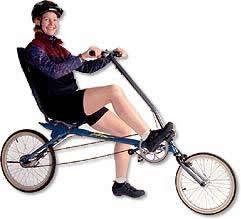Walking and bicycling are not as greenhouse gas friendly as you would think (Michael Bluejay)

Most people think that bicycling doesn’t use gas, but actually it does, indirectly. It takes lots of energy to produce the food for the cyclist’s effort — probably more than you thought.
Of course, we can’t just stop eating, but we can definitely choose what we eat, and here’s the kicker: meat requires much more fossil fuel to produce than vegetables and grains. How much more? About 68 times more for beef than for potatoes. The reason for this is simple: Cattle consume fourteen times more grain than they produce as meat. They’re food factories in reverse. Energy Use While CyclingSo it takes a lot more energy to produce that meat (as well as more land and water). We use absolutely horrific amounts of energy to grow grain to feed to cattle. In fact, over 80% of the grain grown in this country is eaten by livestock, not people. So in short, the more meat you eat, the more gas you waste.
Dr. David Pimentel of Cornell University calculates that it takes nearly twice as much fossil energy to produce a typical American diet than a pure vegetarian diet. This works out to about an extra 200 gallons of fossil fuels per year for a meat-eater. This means that meat-eaters are “driving” an extra fourteen miles every day whether they really drive or not, when we look at how much extra fuel it takes to feed them.
In fact, meat production is so wasteful that walking actually uses more fossil energy than driving a 35 mpg car, if you get your calories for the standard American diet. (On vegetarian or vegan diets, walking uses less energy than driving.)
The same is not true of bicycling vs. driving, because bicycling is more than twice as efficient as walking (calories consumed per distance traveled). Bicycling uses less fossil energy than driving even if the cyclist were eating nothing but beef. But to focus on this misses the point. It’s no bombshell that cycling uses less fossil energy than driving, no matter what you’re eating. What’s important is that meat-eaters use twice as much fossil energy as vegans—whether they’re bicycling or not.
What does this mean in practical terms?
It means that the amount of gas you use isn’t just related to how you get from place to place, it’s also related to what you eat. Meatless diets require half as much fuel to produce as the standard American diet. Pimentel calculated that if the entire world ate the way the U.S. does, the planet’s entire petroleum reserves would be exhausted in 13 years. The typical American could save more gas by going vegan than by giving up driving two days a week.
Those who think the question is, “Is it better for me to drive, or (eat a wasteful diet and) walk or bike?” are missing the point. That’s like asking whether it’s better to pour oil or pesticides into the water supply. Naturally you shouldn’t do either. If you want to greatly reduce your energy and pollution footprint, one of the easiest ways is to reduce or eliminate consumption of animal foods—no matter how you get around.
Food for thought.
Interactive calculator available at https://bicycleuniverse.info/bicycling-wastes-gas/
Conversion from Miles Per Gallon to L/100km https://en.wikipedia.org/wiki/Fuel_economy_in_automobiles
